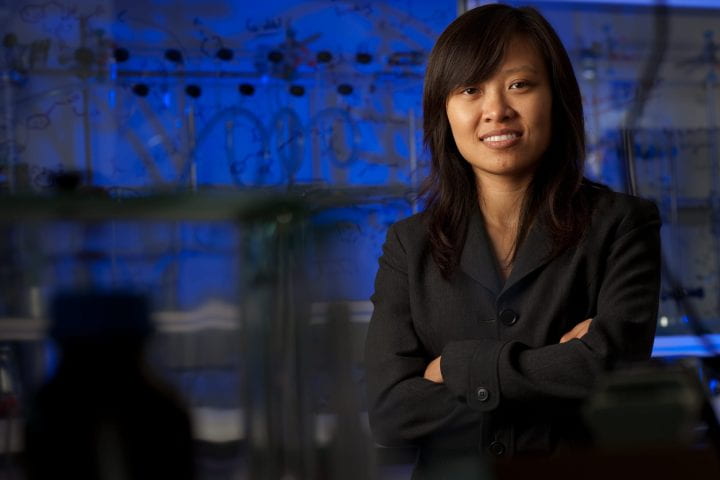A good mix
Vy Dong ’98 is back as a chemistry professor specializing in molecular reactions.

Acclaimed young chemist Vy Dong ’98 has come full circle by returning to UC Irvine’s School of Physical Sciences this fall. Both her family and her alma mater are glad to have her back.
Dong is a Vietnamese American molecular chemistry whiz whose parents fled to the United States after the fall of Saigon in 1975, eventually settling in Orange County. Multiple generations, including her beloved grandmother, still live nearby.
For Dong, UCI is like a second family.
Eighteen years ago, she was an enthusiastic freshman on campus, tentatively majoring in ecology. Her decision to take Distinguished Professor Larry Overman’s organic chemistry class as a sophomore changed her life. Enthralled by his lectures, which illustrated how research could be used to create new medicines and other materials, she switched majors to chemistry and, a few years later, graduated magna cum laude.
Dong, 36, has now returned to UCI as a full professor, recruited by chemistry faculty. Her husband, Wilmer Alkhas (whom she met in Overman’s class as a sophomore), and her entire team of eight doctoral and postdoctoral students relocated with her from the University of Toronto. Alkhas continues as her laboratory manager.
“I feel incredibly fortunate to be back and to have the chance to contribute to UCI,” Dong says. “The department has grown tremendously. What excites me most is the collegial spirit here. Larry Overman remains a mentor and inspiration.”
Overman couldn’t be happier. “Vy Dong is one of the most exceptional synthetic organic chemists of her generation,” he says. “She’s also just a delightful, very engaging personality. She’s a huge asset for both the teaching and research programs at UCI.”
Dong specializes in catalysis, or the speeding up of chemical reactions at the molecular level. “My group focuses on new ways of making bonds,” she says. “The end products would be pharmaceuticals and biological agents. In particular, we’re interested in making molecules that are chiral.”
“Chiral” describes the “handiness” of an object. Like human hands, molecules can be mirror images, duplicates that are incapable of being superimposed on each other. Dong’s group has found a number of novel transformations that allow chemists to selectively manufacture a “right-hand” molecule, which can have a desired health effect, rather than a “left-hand” molecule, which can be harmful.
Overman says Dong was one of his brightest undergraduate students ever and notes that she went on to study with David MacMillan, one of his best graduate students ever. She earned an M.S. at UC Berkeley and a Ph.D. at the California Institute of Technology. When Dong moved to Toronto she started her own research laboratory. She has given more than 100 lectures around the world and received dozens of awards. One of the most important came early on: a Regents’ Scholarship from UCI.
“This merit-based scholarship helped my parents pay for tuition, which was a strong driving force for me to choose Irvine,” Dong says. She
knows such support is critical for families like her own. Sitting in her sunny corner office in Natural Sciences I, her personal history tumbles out.
Dong was born in Texas and moved to Anaheim in the second grade. After leaving Southeast Asia, her father worked as a machinist and her mother as a manicurist, supporting four children. Dong was the first to graduate from college; a sister and brother later earned degrees at UCI too. Her grandmother Hoa was separated from Dong’s grandfather for years after the fall of Saigon, and she headed their extended family in the U.S. on her own. Dong’s grandfather located them through letters in the 1990s, and they reunited in California in 1993.
Although Hoa never had the chance to attend school and doesn’t speak English, Dong recalls her grandmother beaming at her doctoral defense. “My family’s story is probably similar to many of the students’ at UCI,” she says. “Our parents and grandparents immigrated here and worked hard to provide us incredible opportunities.”
Dong will be accepting new graduate students into her laboratory and teaching an undergraduate course in organic chemistry this winter.
“My favorite aspect of the job is working with students,” she says. Just as Overman has watched her and other former students flourish, Dong
is now doing the same with the next generation. “It’s amazing to see them develop as scientists and to play a role in their growth,” she says. “The best part is I get to see a new crop come in every year.”